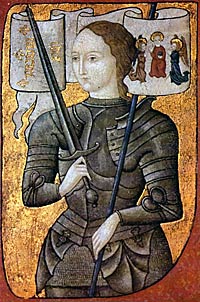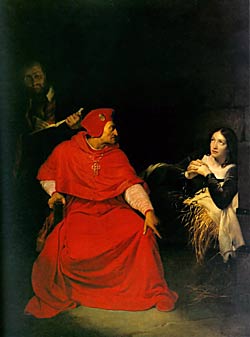Readings:
Psalm 144:1-12
Judith 8:32–9:11
2 Corinthians 3:1-6
Matthew 12:25-30Preface of the Epiphany
[Common of a Martyr]
[Of the Holy Cross]
[For Social Justice]
PRAYER (traditional language)
Holy God, whose power is made perfect in weakness: we honor thy calling
of Jeanne d’Arc, who, though young, rose up in valor to bear thy
standard for her country, and endured with grace and fortitude both victory
and defeat; and we pray that we, like Jeanne, may bear witness to the
truth that is in us to friends and enemies alike, and, encouraged by the
companionship of thy saints, give ourselves bravely to the struggle for
justice in our time; through Christ our Savior, who with thee and the
Holy Spirit livest and reignest, one God, now and for ever. Amen.
PRAYER (contemporary language)
Holy God, whose power is made perfect in weakness: we honor you for the
calling of Jeanne d’Arc, who, though young, rose up in valor to
bear your standard for her country, and endured with grace and fortitude
both victory and defeat; and we pray that we, like Jeanne, may bear witness
to the truth that is in us to friends and enemies alike, and, encouraged
by the companionship of your saints, give ourselves bravely to the struggle
for justice in our time; through Christ our Savior, who with you and the
Holy Spirit lives and reigns, one God, now and for ever. Amen.
This commemoration appears in A Great Cloud of Witnesses
Return to Lectionary Home Page
Webmaster: Charles Wohlers
Last updated: 30 March 2019
JOAN OF ARC
VISIONARY, 30 May 1431
 Joan
of Arc (Jeanne d'Arc, Jeanne la Pucelle) was born in France, near the
border of Burgundy, on 6 January 1412. In her time the King of England
claimed the crown of France by the laws of inheritance, and English troops
were fighting in France to support that claim. (The English King inherited
through a woman, and the French claimants, the House of Valois, asserted
that French law did not allow the crown to be inherited by or through
a woman.) Henry V of England won a decisive victory at the Battle of Agincourt
in 1415 (see Shakespeare's play Henry V, filmed in 1944 starring
Laurence Olivier and in 1993 starring Kenneth Branagh, who emphasizes
the darker aspects of war), and signed an agreement with the Valois monarch
Charles VI, providing that Charles should keep his crown during his lifetime,
that his daughter Catherine should marry Henry, and that Henry should
be the next king. Charles VI had a son (the Dauphin), but the Queen took
an oath that she had been unfaithful to her husband, and that the Dauphin
was not the King's son, and therefore had no right to inherit the throne.
In 1422, Henry V died, leaving an infant son who became Henry VI of England.
England claimed the throne of France in his name. The Duke of Burgundy
supported the English claim, and was allied with England. The French claimant,
the Dauphin (later Charles VII), had not been crowned. Since many Frenchmen
thought that his mother the Queen might be telling the truth about his
illegitimacy, the story largely paralyzed the national will to fight for
Charles.
Joan
of Arc (Jeanne d'Arc, Jeanne la Pucelle) was born in France, near the
border of Burgundy, on 6 January 1412. In her time the King of England
claimed the crown of France by the laws of inheritance, and English troops
were fighting in France to support that claim. (The English King inherited
through a woman, and the French claimants, the House of Valois, asserted
that French law did not allow the crown to be inherited by or through
a woman.) Henry V of England won a decisive victory at the Battle of Agincourt
in 1415 (see Shakespeare's play Henry V, filmed in 1944 starring
Laurence Olivier and in 1993 starring Kenneth Branagh, who emphasizes
the darker aspects of war), and signed an agreement with the Valois monarch
Charles VI, providing that Charles should keep his crown during his lifetime,
that his daughter Catherine should marry Henry, and that Henry should
be the next king. Charles VI had a son (the Dauphin), but the Queen took
an oath that she had been unfaithful to her husband, and that the Dauphin
was not the King's son, and therefore had no right to inherit the throne.
In 1422, Henry V died, leaving an infant son who became Henry VI of England.
England claimed the throne of France in his name. The Duke of Burgundy
supported the English claim, and was allied with England. The French claimant,
the Dauphin (later Charles VII), had not been crowned. Since many Frenchmen
thought that his mother the Queen might be telling the truth about his
illegitimacy, the story largely paralyzed the national will to fight for
Charles.
Into this situation came Joan. When she was thirteen, she began to hear voices telling her that she was called to save France. Eventually she identified these voices as those of Michael the Archangel (mentioned in the Bible in Daniel and Jude and Revelation), and Catherine of Alexandria and Margaret of Antioch, two early virgin martyrs about whom little is known historically (the accounts of their lives as we have them contain many blatant improbabilities, and even among thoroughly conservative Roman Catholics, they are widely thought to be fictional persons), but who were popular in France at that time. Acting, as she said, under direction from her voices, she persuaded a local baron to send her to the castle of Charles at Chinon, where she spoke with the Dauphin (French word for the heir to the throne until he is officially crowned king), and convinced him that her message was genuine. The city of Orleans was under siege by the English. Joan and an army marched to the scene and raised the siege (8 May 1429). She then proceeded to win other battles, and to bring Charles to Rheims to be crowned king. However, the king refused to take her advice that he should press the military advantage. When she attempted to recapture Paris from the English, he denied her adequate support, and the attempt failed.
 Joan of Arc being interrogated by an English cardinal, by Ingres |
Among many literary works inspired by the life of Joan, I mention three:
George Bernard Shaw has written a play about her, Saint Joan. It has a preface for the reader which should not be skipped
Mark Twain has a novel, Personal Recollections of Joan of Arc, supposedly related by a follower of Joan. Twain is a devoted and uncritical admirer of Joan.
Friedrich von Schiller, friend of Goethe and eminent German playwright, has a play, Die Jungfrau von Orleans, which has been highly praised. It is available in translation.
— by James Kiefer